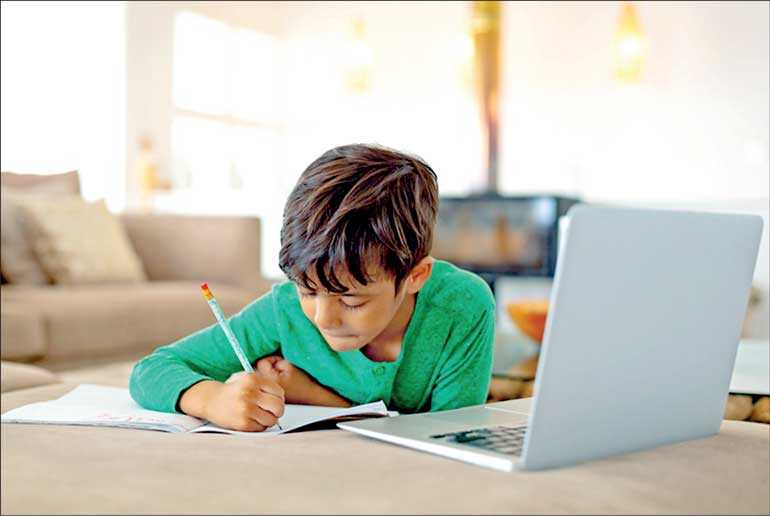Thursday Mar 05, 2026
Thursday Mar 05, 2026
Thursday, 30 April 2020 00:00 - - {{hitsCtrl.values.hits}}

By Sohani Fernando
It is probably not an exaggeration to say that most of the world is grieving inside which is expressed in a variety of ways. It is important to recognise at what stage we are grieving so we can better understand our children. There could be denial, anger, anxiety, frustration, depression, fear, apathy, all of which can be part of the grieving process. The gravity of a pandemic is in the fear of the great unknown. We just don’t know what will happen to us, our country, and the world at large as things are rapidly changing.
While you should be allowing time to grieve for you and your family, don’t let it consume you. Try not to allow yourself or your children to be stuck in negative emotional states as that will be detrimental to their mental wellbeing. A helpful tip is to deliberately plan activities that will make them joyful. It doesn’t have to be anything elaborate, perhaps a pinch of silliness here and there could do wonders for their day! There are great benefits to a simple smile; while it may seem inappropriate to smile at a time when the world is solemnly mourning. 
However, continuous moments of grief and depressed states hurts our ability to cope. When it becomes a downward spiral, without the ability to cope, we become helpless and unhelpful to others. Thereby, it is vital to strike a balance, especially around children, and so try not to grieve all the time, especially in front of them. They need to know how we feel but striking a healthy balance with moments to be thankful, hopeful and helpful to others is vital. Be intentional about offsetting negative emotions with positive ones and engage in practical ways to be hopeful.
Expect varied behaviours from your children
Expect children to display varied behaviours, depending on their emotions and how they regulate their feelings. Some youngsters express their feelings outwardly, while others inwardly and quietly; I am sure adults can relate to this as well. If we suppress feelings, these may be manifested at unexpected moments and at times in inappropriate ways.
For instance, a child may suddenly start screaming for no apparent reason out of feelings of frustrations of not being able to go outside or a child that has slept alone in his or her bed may be fearful and not feel safe to do so now. In another instance, a child may demonstrate apathy and not be motivated to complete his or her school work. Or, a usually calm and introverted child may have sudden outbursts of anger or sobs out loud.
Younger children may start bed wetting while others may start nail biting, fidgeting or twitching just to name a few outward reactions. Yet, even others may show unexpected mood swings or have nightmares. Expect these as normal reactions to traumatic incidents; the COVID-19 pandemic may be affecting your child more than they have expressed or acknowledged.
After the pandemic is resolved some children may start demonstrating emotional and behavioural changes while others will continue on with their lives with no significant changes. It is important to encourage and lead your children in stress management activities daily so that they are able to regulate their emotions more effectively and cope better to adversity in the long term.
By chance, if your children are displaying behaviours that are extreme, out of the ordinary, and/or reoccurring for extended periods of time disrupting their daily functions, then it is important to seek help from a mental health professional.
Depending on your child’s age, personality, resilience, protective factors and coping skills, he or she will react in different ways to the current crisis. Those who are resilient and have strong coping skills may not be affected much by this pandemic but adults should be prepared to nurture children through their emotional and behavioural states. Preparation is key!
Provide more attachments and attention
It is no secret that in times of distress, most humans need to find security and affirmation, and younger children will need more physical attention. While hugging and kissing is not something that is  encouraged during the COVID-19 pandemic, children may be looking for warmth now more than ever before. Use your discretion and best judgement with physical touch.
encouraged during the COVID-19 pandemic, children may be looking for warmth now more than ever before. Use your discretion and best judgement with physical touch.
If you find that kissing your children is not appropriate during this time, you can improvise and find ways to provide attachments in other ways: for instance high fives and pinky hugs with clean hands, where your pinky finger wraps around your child’s pinky or perhaps find them a favourite soft toy to hug. They need to know you are paying attention to them.
We now have one of the greatest opportunities to be excellent listeners. By storing extra doses of patience while we were quietening our spirits in the morning and recharging throughout the day we can give that back to our children. Practice the art of tuning into their needs. These are the days they need the most attention from us, to feel a sense of security and familiarity in the middle of global chaos.
Balance their day and engage their minds
Be mindful about balancing educational experiences with social, emotional and spiritual ones. Pace their school work and lessons so they have fun while learning. The best kinds of learning happen when children move; according to neuroscience, movement and exercise increases blood flow and oxygen to the brain causing more alertness.
Therefore, add movement to their educational experiences and allow them to have fun while learning and completing their school work. While you may be confined to the walls of your home, you can still ask your children to walk, wiggle their legs, stretch their arms, blink their eyes, wave their hands, even while remaining in the same spot to add some kind of movement!
Plan for “thankful” moments
Positive thoughts evoke “feel good” chemicals in our brains, such as endorphin, oxytocin, serotonin and dopamine, which in turn aid in feeling calmer, happier, and less anxious. The opposite is also true; when the brain perceives a threat or danger, cortisol is produced. While cortisol also known as the “stress” hormone has specific functions in our bodies, too much of it causes havoc and various complications.
Therefore, even in the midst of this crisis, plan for thankful moments. Teach your children to think and talk about what they are thankful for. Perhaps they can draw, paint or even write them down. You can collect these in a container and read them whenever you or your children are feeling down and out. Perhaps encourage them to memorise phrases from your religious books that can help them stay positive.
Be mindful of “cabin fever”
Prolonged times of staying in enclosed spaces can result in restlessness, irritability, apathy, depression and anxiety. Cabin fever is a term associated with such feelings of distress when one is in isolation or confined to enclosed spaces.
Movement is a great tool, in any form, whether it is in the form of stretching exercises or walking inside the house. Encourage your children to move to keep their minds alert and their bodies in shape. If you have the luxury of a garden, use it if possible to get some sun and fresh air as this will help in some way to overcome feelings distress.
Provide parent-led choices
Choices empower children but they need to be given choices that are appropriate. During times of pandemics and traumatic events, most children feel helpless and powerless. There is very little that they can control and they observe that their parents have limited capabilities to make their lives normal again. Therefore, give them something to feel empowered about without always telling them what to do; it will give you a break too from micromanagement!
Balance routines with flexibility
Routines are greatly beneficial to keep children engaged in a sense of normalcy, however, having some flexibility is important over rigid routines and structure during this period of quarantine. We need to empower them to make decisions throughout the day, to plan, to set goals, to help, and to choose. Therefore, be flexible and give them these opportunities.
Schedule daily chores
Due to the present pandemic, adults are on a heightened state of alertness. We are on alert for any news update and are in online queues frantically trying to secure basic provisions for our families; we are listening intently for the local vendors to come to our streets, and are constantly sanitising ourselves; we are worried about money and distressed about the global situation; we are caring for elderly parents and can’t sleep at night; we don’t have ample facilities to print our children’s school assignments; we are physically and emotionally drained; and we don’t get a break as we are constantly on the clock washing clothes, cooking, cleaning, babysitting and being strong for our families while struggling on the inside.
Our children are watching our emotional status and therefore need to support their parents. I encourage you to schedule daily age appropriate chores for each member of your household to contribute to supporting one another.
Pay it forward
Encourage your children to give to others without expecting anything in return. Brain storm ways to help others in need, whether it is to write letters to senior citizens who are lonely in Elders Homes, calling relatives to cheer them up, or donating to community service agencies. Currently, even social service agencies that usually supply dry rations to the needy are struggling as their funding has been severely curtailed. They may have the manpower to distribute the goods but don’t have funding to do so.
If you have some extra cash, would your family consider ordering a package to another in need? Perhaps we have an opportunity to sacrifice personal luxuries and gourmet delicacies to feed hungry families in support of our country’s efforts. There is something powerful that happens when we give out of our need. It keeps us humble and empathic towards others in need. Paying it forward helps empower our children to look beyond their needs and makes them stronger human-beings.
More practical steps to help children cope while at home
[The writer, a Licensed Clinical Social Worker (LCSW), is an independent Mental Health Consultant, Psychotherapist and School Counselling Supervisor.]